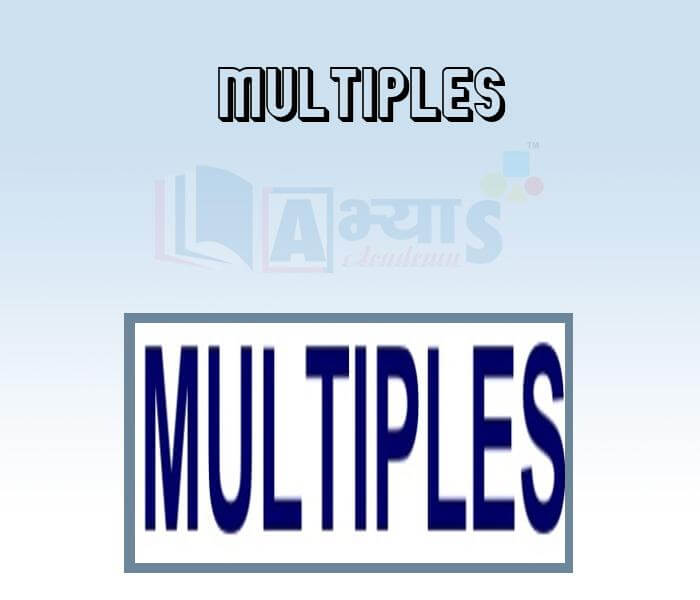Multiples





Multiples
Factors and multiples are different things. But they both involve multiplication: Factors are what we can multiply to get the number. Multiples are what we get after multiplying the number by an integer (not a fraction).
We must multiply by an integer, but the number that is being multiplied can be anything.
Multiples: For getting multiples of a number, we recite the multiplication table of that number.
e.g. multiples of 4 are 4, 8, 12, 16, ...
Perfect number: A number for which the sum of all its factors is equal to twice the number is called a perfect number.
e.g. 28 is a perfect number as shown below
56 = 28 X 2 = 1 + 2 + 4 + 7 + 14 + 28
Note: 1. Every multiple of a number is greater than or equal to that number.
2. The number of multiples of a given number is infinite.
3. Every number is a multiple of itself.
4. A number is a multiple of each of its factors.
Illustration: Find the multiples of 12.
Solution: ..., 12, 24, 48, 60, ...
Illustration: Find first five multiples of 6.
Solution: The required multiples are
6 X 1 =6
6 X 2 = 12
6 X 3 = 18
6 X 4 = 24
6 X 5 = 30
Hence, the first five multiples of 8 are 6, 12, 18, 24, 30
1 is ________________ | |||
| Right Option : C | |||
| View Explanation | |||
Find the number which when multiplied by 12 gives 36. | |||
| Right Option : A | |||
| View Explanation | |||
Factor X factor is equal to: | |||
| Right Option : B | |||
| View Explanation | |||
Students / Parents Reviews [10]
Being a parent, I saw my daughter improvement in her studies by seeing a good result in all day to day compititive exam TMO, NSO, IEO etc and as well as studies. I have got a fruitful result from my daughter.

Prisha Gupta
8thAbout Abhyas metholodology the teachers are very nice and hardworking toward students.The Centre Head Mrs Anu Sethi is also a brilliant teacher.Abhyas has taught me how to overcome problems and has always taken my doubts and suppoeted me.

Shreya Shrivastava
8thIt has a great methodology. Students here can get analysis to their test quickly.We can learn easily through PPTs and the testing methods are good. We know that where we have to practice

Barkha Arora
10thI have spent a wonderful time in Abhyas academy. It has made my reasoning more apt, English more stronger and Maths an interesting subject for me. It has given me a habbit of self studying

Yatharthi Sharma
10thAbhyas is a complete education Institute. Here extreme care is taken by teacher with the help of regular exam. Extra classes also conducted by the institute, if the student is weak.

Om Umang
10thAbhyas Methodology is very good. It is based on according to student and each child manages accordingly to its properly. Methodology has improved the abilities of students to shine them in future.

Manish Kumar
10thIt was good as the experience because as we had come here we had been improved in a such envirnment created here.Extra is taught which is beneficial for future.

Eshan Arora
8thIt was a good experience with Abhyas Academy. I even faced problems in starting but slowly and steadily overcomed. Especially reasoning classes helped me a lot.

Cheshta
10thMy experience with Abhyas is very good. I have learnt many things here like vedic maths and reasoning also. Teachers here first take our doubts and then there are assignments to verify our weak points.

Shivam Rana
7thMy experience with Abhyas academy is very good. I did not think that my every subject coming here will be so strong. The main thing is that the online tests had made me learn here more things.
